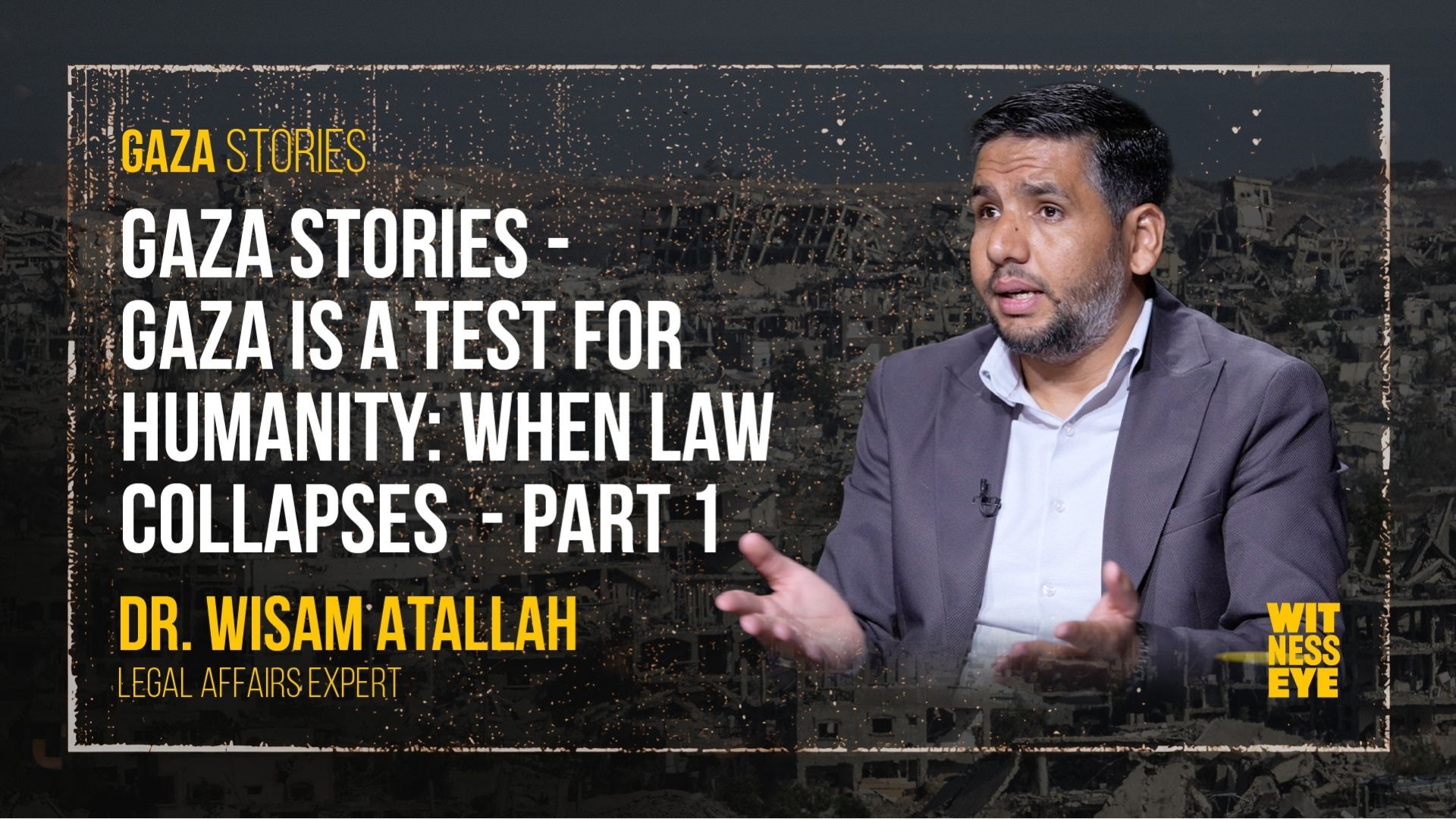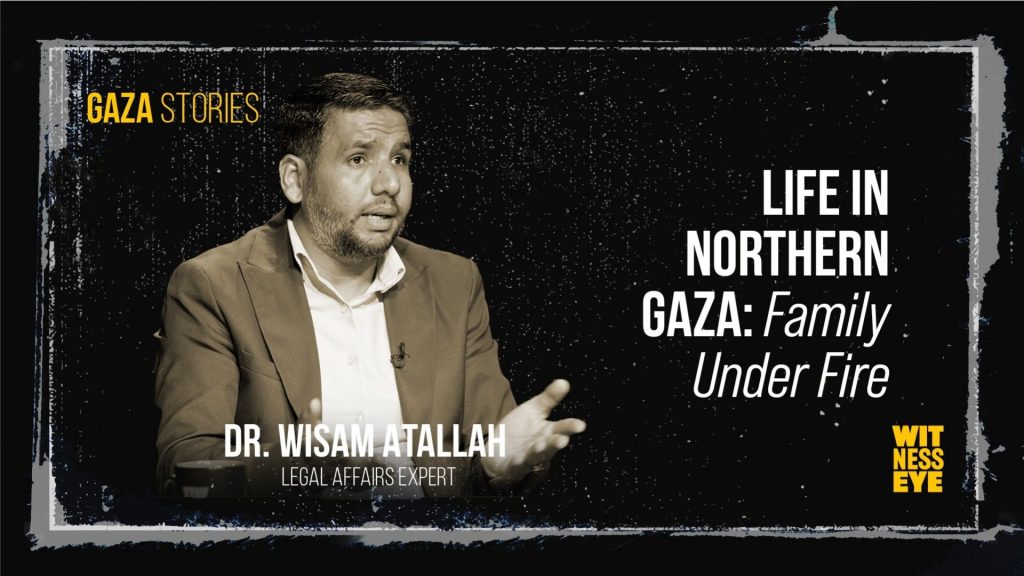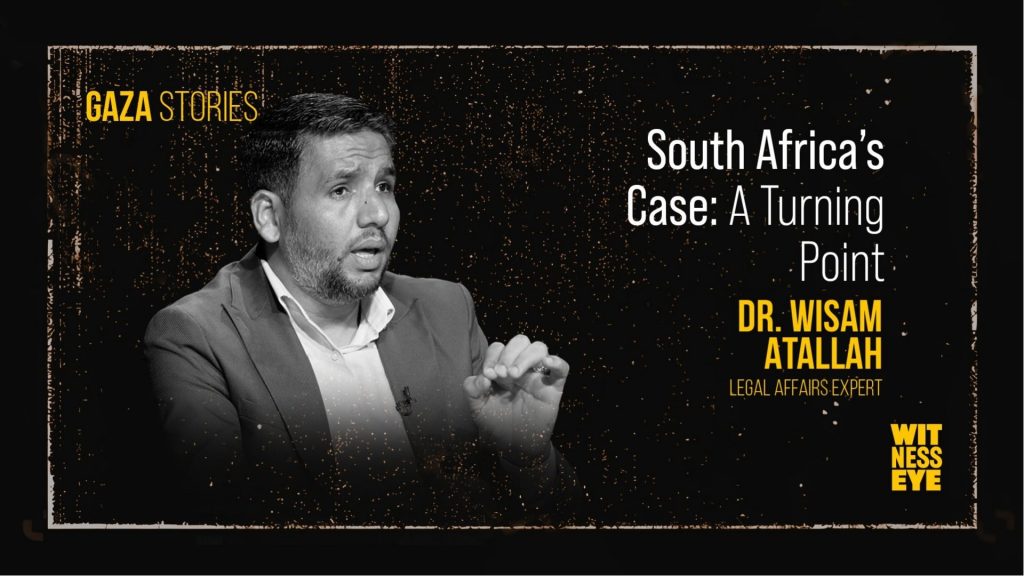
The war in Gaza has lasted over 620 days, leaving behind more than just physical destruction. Entire generations are being marked by hunger, displacement, and deep sorrow. Among those who carry both grief and duty is Dr. Wisam Atallah. He is a legal scholar and a political researcher. But he is also a victim of this war. His home was destroyed. His family was torn apart. Many of his relatives remain in northern Gaza. They live without shelter, food, or medicine. These losses reveal the harsh reality he faces every day. Despite all this, Dr. Atallah continues to speak out.
What he shares is not just a study of law; it is a life story reflecting the painful truths of Gaza. He shows how international law crumbles in the face of such immense destruction. Dr. Atallah’s words not only tell of suffering, but also serve as a warning for humanity—a call for justice that refuses to be ignored.

Life in Northern Gaza: Family Under Fire
Dr. Wisam Atallah begins not with theory but with family. His relatives remain in northern Gaza, where entire neighborhoods no longer exist. “When the highest numbers of dead are women and children,” he says, “the statistics alone tell the story of genocide.” For his family, the war erased not only homes but also dignity. Hunger now dictates daily life, and survival means scavenging for scraps under shelling.
Starvation as a Weapon of War in Gaza
What shocks Dr. Atallah most is not only the bombings but the use of hunger as a tool of war. He describes “starvation management” — trucks bringing token amounts of food for two million starving people. These convoys, he says, are not relief but death traps. Each day since the ceasefire’s collapse, at least fifty martyrs fall in stampedes and attacks around aid trucks.
He recalls the words of Yoav Gallant, Israel’s former defense minister, who declared on October 8: “No food, no medicine, no fuel. We are fighting human animals in Gaza.” For Dr. Atallah, this statement is not rhetoric but a blueprint carried out systematically. “Even animals,” he says bitterly, “have rights. But in Gaza, people are denied the most basic rights of existence.”
The Legal Lens: Why Gaza Is Genocide
Dr. Wisam Atallah does not hesitate to call Gaza’s war by its name: genocide. As an academic in international law, he explains that the crimes committed go beyond “war crimes” or “violations.” In Gaza, he argues, Israel’s actions meet every condition of this definition. The killing of over 17,000 children, the destruction of hospitals and schools, and the starvation policy are not random acts of war — they are systematic extermination. In his lectures, students often ask why these international laws, so carefully taught in textbooks, seem never to apply to Gaza. His answer is stark: “Israel has thrown all laws and customs against the wall.” From the bombing of UNRWA schools like Al-Fakhoura in 2008 to the storming of hospitals in 2024 and 2025, the pattern is one of deliberate disregard for humanitarian law.
What makes this war unprecedented, Dr. Atallah insists, is that the law itself is under attack. “Netanyahu not only killed children and destroyed hospitals,” he says, “he also killed international law, humanitarian conventions, and the very principles humanity agreed upon after World War II.”

South Africa’s Case: A Turning Point
For Dr. Atallah, hope lies in one critical moment: South Africa’s case against Israel at the International Court of Justice (ICJ). In November 2023, only weeks after the war began, South Africa filed an 84-page legal document accusing Israel of genocide under the 1948 Convention. “South Africa stood on the side of humanity,” he notes. Their history of apartheid and racial oppression allowed them to recognize in Gaza what others tried to ignore. When the ICJ accepted the case, 14 out of 15 judges voted in favor. For the first time in history, Israel faced the official charge of genocide before the world’s highest judicial body. The case also emboldened others. Dr. Atallah calls this a precedent: “For the first time since 1948, an Israeli prime minister is wanted for crimes against humanity.”
International Law on Trial on Gaza
For Dr. Wisam, Gaza is not only a battlefield of bombs but also a battlefield of laws. He reminds us that the International Court of Justice itself described the war as genocide. Yet, he says, “laws are being killed just as civilians are being killed.”
He points to Israel’s bombing of schools, hospitals, and UN shelters — acts that international law explicitly forbids. He recalls the Al-Fakhoura school massacre of 2008, where dozens were killed inside a UNRWA shelter. “Even then,” he explains, “world leaders argued over human rights while nothing changed on the ground.”
Israel banned UNRWA entirely, cutting off aid, education, and medical services for millions. Trucks carrying food arrive only to become death traps, with starving families gunned down as they gather for flour. “This is not aid,” Wisam says, “this is starvation management combined with systematic killing.”
He underlines the hypocrisy of international justice. The ICC issued an arrest warrant for Vladimir Putin over transferring Ukrainian children — “transfer, not killing,” he stresses — but remains hesitant when 17,000 Palestinian children have been killed. The double standard, he argues, exposes the fragility of the global legal system.
“Gaza is a test for humanity,” Dr. Wisam says. “If international law cannot protect Gaza, then it cannot protect anyone.”
The Human Cost of Disproportion
International law requires proportionality in war, but Gaza has seen the opposite. Sixty to seventy houses “vaporized” in one strike, leaving nothing behind. “I met families who could not even recognize their loved ones’ remains,” Dr. Wisam said. “This is complete extermination.” Even hospitals and schools, where Israel claimed to see fighters, were proven empty when international media inspected them. “Even if there was one fighter,” he stressed, “it does not justify killing hundreds of civilians.”
Starvation as a Weapon in Gaza
Dr. Wisam Atallah explained that starvation in Gaza is not an accident but a deliberate policy. “This is not aid,” he said, “it is starvation management.” A few trucks arrive for two million people, and those who gather around them are often killed. He described these places as death traps. Every day, dozens die in the stampede for food, not because of hunger alone, but because Israeli forces target them. “Starvation itself has become a weapon of war,” he added, stressing that this has no precedent in modern history.
Orphans and Generational Loss in Gaza
One of the darkest outcomes, Dr. Wisam noted, is the rising number of orphans. More than 80,000 children in Gaza have lost one or both parents. At least 3,000 lost both. “He has no father, no mother, no grandfather,” Dr. Wisam explained. “Only a sick grandmother struggling to care for him.” These stories, he said, are not isolated—they are part of a collective catastrophe shaping a broken generation.
The Collapse of Shelter and Aid
UNRWA, once the backbone of Gaza’s relief system, is now banned. Schools that once served as shelters turned into massacre sites. Dr. Wisam recalled the Al-Fakhoura school bombing in 2008, where hundreds of displaced civilians were killed. “Even UN centers are not safe,” he explained. “History repeats itself: shelter becomes a grave.” Families sleep in the open, thirsty and hungry.
Orphans and the Generational Wound
One of his cousins, along with her husband and children, sought shelter in Jabalia camp. Within seconds, a seven-story building collapsed under bombs, leaving no survivors. “It was complete genocide,” he says. The only one who lived was a small child who had insisted on staying with his grandmother. His parents, grandparents, and uncles are gone. “You can barely find bread for him, let alone medicine if he gets sick,” Dr. Wisam explains. He stresses that this story is not an exception but a fragment of a much larger tragedy. Gaza now has more than 80,000 orphans, including at least 3,000 children who lost both parents. Their silence today will shape the cries of tomorrow.”
Genocide in the Court of Law
The legal classification, according to Dr. Wisam, is clear. War crimes, crimes against humanity, aggression, and genocide—Israel has committed them all. In November 2023, South Africa filed a case at the International Court of Justice. Within weeks, the file reached 84 pages, filled with evidence and testimonies. “This is not Palestine accusing Israel,” Dr. Wisam stressed. “This is the highest court in the world, and 14 out of 15 judges accepted the case.”
Accountability and Arrest Warrants
For the first time in history, an Israeli prime minister faces an arrest warrant. The International Criminal Court moved forward with cases against Benjamin Netanyahu and former defense minister Yoav Gallant. Dr. Wisam explained: “They cannot enter 124 countries now without risking arrest.” This precedent, he added, only became possible because the ICJ accepted South Africa’s genocide case. “Gaza forced the system to move,” he said, “even if slowly.”
Gaza is a Test for Humanity
“What is happening in Gaza is not just a war,” Dr. Wisam warned. “It is a test—for humanity, for international law, for the United Nations itself.” He described how Israel not only killed children and women, but also “killed international law, killed humanitarian law, killed the Geneva Conventions.” For him, the silence of 193 UN member states, even when Israel’s representative tore up the UN Charter on stage, proved the collapse of global accountability.
The Illusion of International Institutions
Dr. Wisam compared today’s UN to the failed League of Nations, which collapsed after it failed to prevent World War II. In his view, history is repeating itself, and the international body once created to safeguard peace is now unable to act. “The Security Council is paralyzed,” he said, stressing that even the highest seat of global authority has been reduced to silence. For this reason, he described the UN as little more than a hollow symbol: “The UN has become an idol made of plaster—decorations with no power.”
Moreover, he argued that this failure is not limited to the Security Council alone. Institutions like UNICEF and UN Women, which were established to defend the most vulnerable, also remained silent as thousands of women and children were killed. In fact, their absence of action left him questioning their very existence. “If they cannot protect the most vulnerable,” he asked bitterly, “what purpose do they serve?”
The Unfinished Case
Despite this, Dr. Wisam insists the legal struggle is far from over. Dr. Wisam reminds us that genocide is a crime with no expiry date. Each new country joining South Africa’s case brings more voices, more evidence, and more weight to Gaza’s cry for justice. “Even if justice is delayed, the record is written,” he said. “Israel is now officially a genocidal state in the eyes of history.” For him, the case is not just about Palestine but about humanity’s credibility. “If Gaza falls,” he warned, “the entire system of law falls with it.”
Gaza Stories – Through the Witnessing Eye
Listening to Dr. Wisam, one truth becomes clear: Gaza is not only a battlefield, it is a mirror. The famine, the bombed schools, the mass graves—all reveal how fragile our shared humanity has become. International law was designed to prevent this, yet in Gaza it is being buried under rubble. His testimony is not only about one land; it is about whether justice can still exist anywhere. Until silence breaks, until accountability begins, these Gaza Stories will continue to demand a place in the world’s conscience. Hear the testimony of Dr. Wisam Atallah—an academic, survivor, and voice of Gaza—exposing the collapse of international law, the silence of global institutions, and the unbroken resolve of a people demanding justice.
Stay Connected with Witness Eye
Follow us on our official channels:
